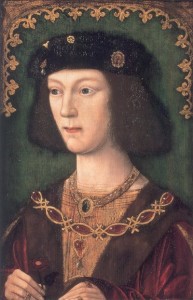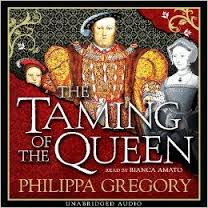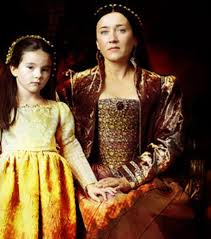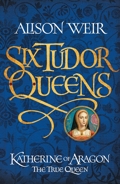As I was watching the Celebrity Big Brother Final on Friday, a strange thought occurred to me. In a house full of contestants from the Tudor era who would emerge victorious? Would Thomas Cromwell calculate a winning game plan? Would Anne Boleyn see off Katherine of Aragon? Who would Catherine Howard hook up with, and how many minutes would it take her to do so? In other words ‘who would win Tudor Big Brother’?
For a #BitofFun I decided to bash out a blog post with #NoHistoricalValue to explore this very question. Here we go…
*
WEEK ONE
Up for eviction: Catherine Howard, Henry VII, Anne Boleyn, Anne of Cleaves
Evicted: Anne Boleyn
It is perhaps no great surprise that the Lady Anne becomes the first housemate to leave the Tudor Big Brother House. Having made no secret of her brazen game plan to win at any cost, she quickly earnt the disdain of her female housemates, every one of whom nominated her for eviction. While she held a ‘fascination’ for some male members of the house, her brittle manner clearly grated with the English public who have sent her to the block at their first opportunity. For many, the final straw was her guns-a-blazing row with fellow housemate Jane Seymour, which earned her a reprimand from Big Brother for ripping a locket off the ‘little wench’s’ neck.
“No one minds a girl on the make,” comments TV Vicar Rev.Thomas Cramner, “but it’s the 16th century people – we expect some subtlety!”
WEEK TWO
Up for eviction: Catherine Howard, Henry VII, Mary Tudor (The French Queen), Thomas Wolsey
Evicted: Henry VII
After two weeks and two evictions in the Tudor Big Brother House, there have still been no surprises. Despite Catherine of Aragon’s spectacular fall out with Thomas Wolsey (which saw the former punished by Big Brother for orchestrating a nominations campaign against the latter) there was never any real doubt that it was Henry VII that would incur the wrath of housemates and the public alike. While a few boundaries here and there might be helpful, the contestant’s obsessive need to impose fines on fellow housemates for the slightest misdemeanour was never likely to ingratiate him with others and once you’ve charged Charles Brandon £100 for not doing the dishes seven times, it quickly ceases to be gripping viewing.
“He spent his early years in France,” his mother, Margaret Beaufort told sister show ‘Big Brother’s Wench on the Side’, “and it’s possible he picked up one or two bad autocratic habits over there. But at the end of the day I just wish everyone saw him like I do – after all, he is my dear King and all my worldly joy!”
WEEK THREE
**DOUBLE ELIMINATION**
Nominated for eviction: Charles Brandon, Henry VIII, Catherine Howard, Thomas Wolsey
Evicted: Charles Brandon, Catherine Howard
It had all started so well for the dashing Brandon. Charming to the ladies, eloquent in the diary room and part of a bromance with fellow housemate Henry VIII which captured the imagination of the public. But then he broke the brother code. What seemed like a harmless flirtation with Mary Tudor stepped up a notch this week, earning him the jealous disinterest of female housemates and the rage of his new flame’s brother. The arguments that followed were too much for the Tudor Big Brother House and from the pile of nominations Brandon received, it’s clear the housemates sided with Henry. Tonight’s eviction shows that no traitor can ever keep the affections of the English people, however much he might be able to steal the heart of their Princess.
Catherine Howard on the other hand, has done well to survive as long as she has, having faced the public vote every week of the contest. Her girlish antics including hours at the make-up station and constantly trying to start pillow fights may have amused her male housemates, but quickly earned her the chagrin of their female counterparts.
“It’s pretty obvious why she survived the first two weeks though,” says celebrity commentator Thomas Culpepper. “She’s petite, plump and pretty – every bloke in the country’s been voting for her! With tonight’s eviction the eye-candy quota is seriously on the slide.”
WEEK FOUR
**SHOCK TWIST – Public vote to evict two contestants WITHOUT nominations from the house**
Evicted: Thomas Cromwell, Thomas Wosley
Has Big Brother ever seen a bigger pair of game players? By deploying every tactic under the sun and cosying up to whoever holds the balance of power in the house, as well as keeping everyone on side by taking most of the boring chores off their hands, these two strategists had largely avoided nomination. However the public had seen what housemates had not. The secret strategy sessions, the willingness to throw others (including each other) under the bus and the sinister comments in the diary room. This week, voters finally got chance to cast their own judgement and it was ‘off with their head’ for both of them.
WEEK FIVE
**DOUBLE ELIMINATION**
Nominated for eviction: Henry VIII, Mary Tudor, Jane Seymour, Anne of Cleaves
Evicted: Henry VIII, Mary Tudor
Just weeks ago, the stunning, learned and cultivated Henry VIII had been the bookies favourite to win but as the days went by his star slowly diminished as he faced problem after problem. First of course, was the slight irritation of other housemates when he kept stringing along Katherine of Aragon. Then there was the bust up with Brandon, but the moment the public really began to lose sympathy with the auburn haired Tudor, was his decision last week to nominate Anne of Cleaves, purely on the basis that she ‘looked like a horse.’ It wasn’t that he was saying anything that people weren’t thinking – but this is England, and there are some things you don’t say,
“The public have no idea how hard it is to keep a trim waistline inside that house,” says Edward III, winner of ‘Plantagenet Big Brother’, “but the way Henry piled on the pounds in there was something else altogether. At the end of the day, this is the Tudor era and image is everything.”
There is however, far less to say about Mary “the French Queen” Tudor’s eviction. And that’s definitely not because the author of this post has yet to read a really good biography on her and has only limited knowledge, making it difficult to think of something funny to say. Oh no. It’s not that at all.
WEEK SIX – THE FINAL
Finalists: Anne of Cleaves, Katherine of Aragon, Katherine Parr, Elizabeth of York.
It’s an all-girl final on ‘Tudor Big Brother’ – the lines are closed and the results are in.
Fourth place – Anne of Cleaves – In the first couple of weeks, no one expected the shy and reserved Lady Anna to last all the way to the final. Struggling with the language and keeping herself to herself, she wouldn’t even remove her veil for the first few days. Most worryingly, fellow housemates kept complaining about ‘offensive odours’ emanating from her direction, but suddenly things got better. Some impressive country dancing, an emerging sense of dignity and a thirst for survival managed to endear her to housemates, saving her from facing the public vote until last week. Loving nothing more than the rushing to the rescue of a wronged woman, the public chose instead to eject Henry VIII who had, quite frankly, been rather mean about poor Anna ever since week 1.
Third place – Elizabeth of York – Didn’t she do well? By instantly adopting the position of house Mum, ‘our Liz’ (as she is commonly known) was adored by the housemates who in diary room visit after diary room visit just couldn’t find a bad word to say against her. Although her constant bragging that she was ‘young enough to have more children’ started to grate with some of the other girls, her redeeming qualities saved her from being nominated even once, handing her a place in the final without even having to face the public vote.
Second place – Katherine of Aragon – At first, things didn’t look good for the house’s only Spanish contestant. Fawning over Henry VIII – who fluctuated between leading her on and callously rejecting her – and being bullied by Anne Boleyn, housemates, the public and commentators alike were wondering when this woman was going to grow a backbone and that’s exactly what she did. From her vengeful gloating at the eviction of Anne Boleyn to her fierce rowing with Wolsey, the Infanta showed us all that she was nobody’s victim and has taken the fight all the way to the final.
WINNER – Katherine Parr – Surely from now on to be known as ‘the great survivor’ this lowly knight’s daughter has delivered entertainment, enrichment and excellent game-play over an entire series. Helpful and chirpy around the house, this year’s winner was no wall flower, arguing about religion and squaring up to opponents. She knew how to survive, even when it meant backing down.
TV psychologist Katherine Willoughby says, “Any woman who can stay up most of the night reading illegal protestant books with a torch under her covers, but is also first up for morning mass the next day is going to be complex psychologically as well as pretty hard headed. I certainly wouldn’t want to take her on.”
*
Editor’s note: Unfortunately Jane Seymour was removed from the house in week three due to ill health.
**
Anyway, just some thoughts from me. But the question is geeks – who would you want to see in the Tudor Big Brother House and what do you think would happen?




.jpg)




